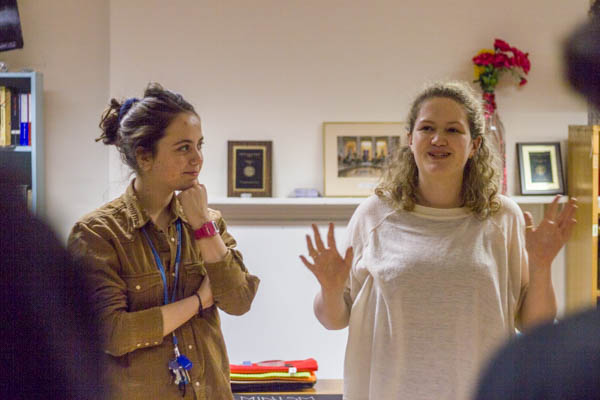In House Six, DU Gender Equality Society (DUGES) and the Environmental Society struck a balance between serious political discussion and a relaxed, welcoming environment.
The workshop offered an introduction to “ecofeminism” a concept with which, it seemed at first, most attendees were unfamiliar. Though everyone was allied in some capacity with feminism, environmental justice, or both, it was with interest – albeit some mystification – that the small assembly gathered to learn about their overlapping interests.
At the beginning, the question “are women more linked to the environment than men?” saw everyone flitting between positions of “strongly agree”, “strongly disagree”, and “I dunno”, getting the conversational juices flowing from all viewpoints.
Some strongly agreed with this intrinsic link between women and the environment, a conceptual link of femininity and “Mother Earth”. On the other side were the disagreers, holding that such a link isn’t, or shouldn’t, be prevalent. Those standing awkwardly in the centre of the room, however, were mostly unsure. It was these differing opinions and the laid-back discussion thereof which set the tone for the evening.
Addressing the relationship between feminism and environmentalism, an introductory presentation highlighted the main premise of ecofeminism: that the system that is responsible for oppression based on gender, race, or class is the same as that which is responsible for the suppression of nature, and the destruction of the environment.
This wasn’t merely a delivery of information, however, but rather a platform to encourage all-round discussion. In the handing out of case studies in smaller groups, the workshop progressed through both appraisal and criticism of different aspects of ecofeminism.
The work of many women at the forefront of environmental movements was highlighted, from Wangari Maathai and the Green Belt Movement in Kenya, to authors such as Vandana Shiva and Caroline Merchant. The role of women as first responders to environmental degradation was emphasised. Given women’s common role as caregivers in places first affected by climate change, many women are placed at the front line of the movement against environmental destruction. In the understanding that 60 per cent of environmental justice group membership worldwide is female, discussion was held on the contribution of women to these efforts worldwide.
It was noteworthy that the conversation was focused on neither North America or western Europe, but rather encompassed the role of women in environmentalism on a global scale.
It wasn’t all heavy politics, however. The workshop leaders guided rather than dictated conversation to provide a warm and relaxed atmosphere in which to express both agreeing and contrary views. Coupled with the occasional pun on veganism, a friendly and informative Wednesday night discussion was engaging, without becoming too serious. All in all, the collaboration of these two societies created a casual but informative introduction to a broad, but lesser-known, ideology. With the offer of further literature at the workshop’s conclusion, the door to further exploration of ecofeminism had been opened after an enjoyable and engaging introduction.
Throughout the evening, work had progressed on a poster. We all contributed, adding to and outlining the key concepts discussed. In the end, it turned into a rather apt summation of the evening’s discussion: because what workshop is complete without “anti-capitalism” written in glitter?







